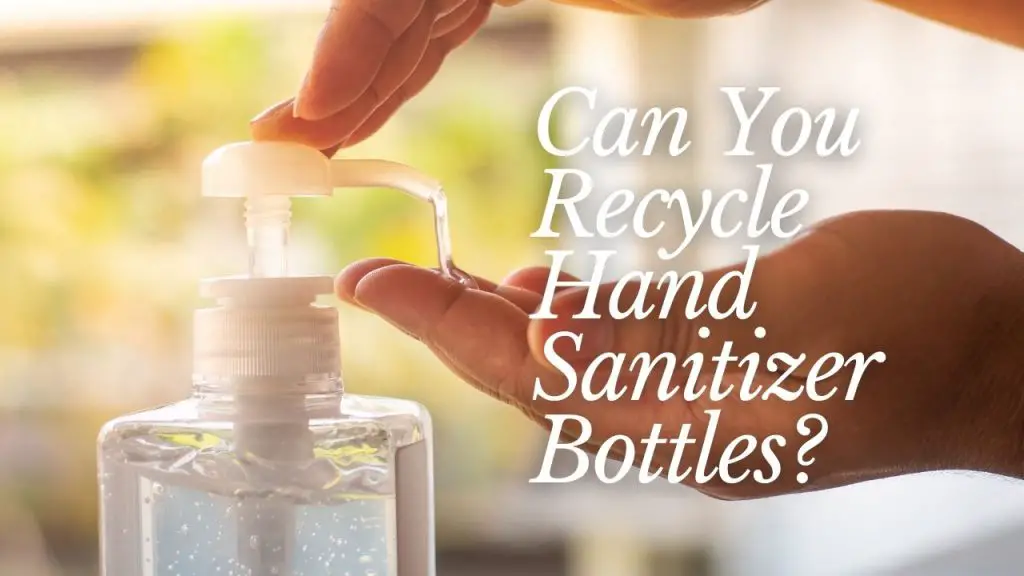Recycling hand sanitizer bottles is generally possible, although it may depend on the specific type of bottle and the recycling facilities in your area. Here are some general guidelines for recycling hand sanitizer bottles:
- Check the label: Look for a recycling symbol on the bottle, such as the “triangle with arrows” symbol. If the symbol is present, the bottle is likely recyclable.
- Remove the pump: Many hand sanitizer bottles have a pump dispenser that is not recyclable. You will need to remove the pump before recycling the bottle.
- Rinse the bottle: It is essential to rinse out the bottle before recycling it, to remove any residual hand sanitizer or other residues.
- Check with your local recycling facility: Recycling programs and guidelines vary by location, so it is a good idea to check with your local recycling facility to confirm that they will accept hand sanitizer bottles.
In general, hand sanitizer bottles are made of plastic and can be recycled along with other types of plastic bottles. However, checking with your local recycling facility is always a good idea to confirm what materials they will accept.
The Importance of Recycling Hand Sanitizer Bottles
Recycling hand sanitizer bottles is essential for several reasons. Here are a few:
- Environmental protection: Recycling reduces the demand for raw materials and the energy needed to extract and process them, which helps to protect the environment.
- Waste reduction: Recycling hand sanitizer bottles helps to reduce the amount of waste that ends up in landfills, which can help to mitigate the negative environmental impacts of landfilling, such as greenhouse gas emissions and habitat destruction.
- Resource conservation: Recycling helps conserve natural resources, such as oil and water, used in producing plastic.
- Climate change: Recycling hand sanitizer bottles can also help to reduce greenhouse gas emissions, as the production of recycled plastic generates fewer emissions than the production of new plastic.
- Economic benefits: Recycling can also have economic benefits, as it creates jobs and reduces waste management costs for businesses and communities.
Recycling hand sanitizer bottles is essential in protecting the environment, conserving resources, and promoting a sustainable future.
Need more hand sanitizer? These are the top 5 bestsellers on Amazon!
How to Know if Your Hand Sanitizer Bottle is Recyclable
One way to determine if your hand sanitizer bottle is recyclable is to look for a recycling symbol on the bottle, such as the “triangle with arrows” symbol. This symbol indicates that the material is recyclable in most areas.
Another way to check is to contact your local recycling facility and ask if they accept hand sanitizer bottles. Recycling programs and guidelines vary by location, so you must check with your local facility to confirm what materials they will accept.
It is also important to note that hand sanitizer bottles may have other components, such as a pump dispenser, that are not recyclable. In these cases, you will need to remove the non-recyclable components before recycling the bottle.
Finally, remember that even if a hand sanitizer bottle is technically recyclable, it may not be accepted by your local recycling facility if it is contaminated with hand sanitizer or other residues. It is essential to rinse out the bottle before recycling it to ensure that it is clean and ready for recycling.
Alternatives to Recycling: Reusing Hand Sanitizer Bottles
If recycling is not an option or if you want to reduce waste even further, you may be able to reuse your hand sanitizer bottle. Here are a few ideas for reusing hand sanitizer bottles:
- Refill the bottle: If you have a refillable hand sanitizer bottle, you can refill it with your hand sanitizer or purchase refills from a manufacturer or retailer.
- Use the bottle for another purpose: Hand sanitizer bottles are often made of durable plastic and may help store other liquids or small items. For example, you could use an empty hand sanitizer bottle to hold shampoo, conditioner, or other personal care products while traveling.
- Donate or sell the bottle: If you no longer need the hand sanitizer bottle, you may be able to donate it to a school, office, or other organization that could use it. Alternatively, you could sell the bottle to someone who can reuse it.
Overall, reusing hand sanitizer bottles is a great way to reduce waste and preserve natural resources. While recycling is always a good option, reusing can be even more sustainable if it keeps a product in use for longer.

The Environmental Impact of Landfilling Hand Sanitizer Bottles
Landfilling hand sanitizer bottles can have negative environmental impacts in several ways:
- Greenhouse gas emissions: When plastic waste decomposes in a landfill, it releases methane, a potent greenhouse gas contributing to climate change.
- Habitat destruction: Landfills can take up large land areas, leading to habitat destruction for plants and animals.
- Pollution: Landfills can also pollute the air and water, as chemicals from the waste can leach into the environment.
- Resource waste: Landfilling hand sanitizer bottles means that the resources used to produce them, such as oil and water, are lost and cannot be reused.
Overall, landfilling hand sanitizer bottles can have serious environmental consequences, and recycling is a much more sustainable option. Recycling hand sanitizer bottles can reduce greenhouse gas emissions, protect habitats, and conserve resources.
Conclusion
Recycling hand sanitizer bottles is a critical way to reduce waste, conserve natural resources, and protect the environment. While recycling may not be possible in all cases, there are steps you can take to ensure that your hand sanitizer bottles are recycled or reused if possible.
Remember to check the label for a recycling symbol, remove any non-recyclable components, and rinse the bottle before recycling. You can also consider reusing the bottle or donating it to someone who can reuse it.
By taking these steps, you can help to reduce the environmental impact of hand sanitizer bottles and contribute to a more sustainable future.






